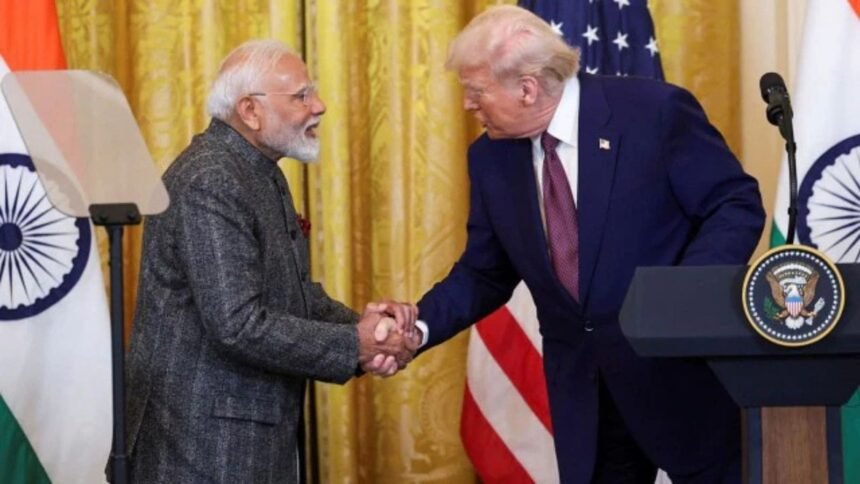India Russian oil trade 2025: Responding sharply to United States President Donald Trump on Monday raising the issue of India buying oil from Russia and profiting from it, New Delhi has said that the targeting of India is unjustified and unreasonable, and the country will take all necessary measures to safeguard its national interests and economic security.
In a post on his social media platform, Truth Social, Trump posted in the evening, “India is not only buying massive amounts of Russian oil, they are then, for much of the oil purchased, selling it on the open market for big profits. They don’t care how many people in Ukraine are being killed by the Russian war machine. Because of this, I will be substantially raising the tariff paid by India to the USA.”
His latest attack came days after he announced 25 per cent tariffs and an unspecified “penalty” on India for its defence and energy imports from Russia.
In a statement issued late Monday evening, the Ministry of External Affairs said that India began importing from Russia since traditional oil supplies were diverted to Europe after the Russia-Ukraine conflict started. Earlier, addressing an event in New Delhi, External Affairs Minister S Jaishankar spoke of the desire for a fair global order, not one dominated by a few.
“India has been targeted by the US and the European Union for importing oil from Russia after the commencement of the Ukraine conflict. In fact, India began importing from Russia because traditional supplies were diverted to Europe after the outbreak of the conflict,” said a statement issued by MEA spokesperson Randhir Jaiswal on Monday. “The US at that time actively encouraged such imports by India for strengthening global energy markets stability.”
On the sourcing of energy needs, New Delhi has maintained that India is guided by what is available in the markets and by prevailing global circumstances. Jaiswal on Monday said India’s imports were meant to ensure predictable and affordable energy costs to the Indian consumer. “They are a necessity compelled by the global market situation. However, it is revealing that the very nations criticising India are themselves indulging in trade with Russia. Unlike our case, such trade is not even a vital national compulsion (for them),” he said.
The MEA statement called out the US and European Union for continuing their trade with Russia. “The European Union in 2024 had a bilateral trade of Euro 67.5 billion in goods with Russia. In addition, it had trade in services estimated at Euro 17.2 billion in 2023. This is significantly more than India’s total trade with Russia that year or subsequently,” it said.
Story continues below this ad
Europe-Russia trade includes not just energy, but also fertilisers, mining products, chemicals, iron and steel and machinery and transport equipment, Jaiswal said.
“Where the United States is concerned, it continues to import from Russia uranium hexafluoride for its nuclear industry, palladium for its EV industry, fertilisers as well as chemicals,” said the MEA spokesperson, adding, “In this background, the targeting of India is unjustified and unreasonable. Like any major economy, India will take all necessary measures to safeguard its national interests and economic security.”
Speaking at the First BIMSTEC Traditional Music Festival in New Delhi on Monday evening, Jaishankar said, “We live in complicated and uncertain times. A collective desire is to see a fair and representative global order, not one dominated by a few.”
“That quest is often articulated as political or economic rebalancing. But I want to say this to you – obtaining respect and ensuring dignity for societies can also be achieved through cultural prowess – especially, through cultural prowess,” he said.
Story continues below this ad
Last week, Trump had announced that imports from India will attract 25 percent tariffs from August 1, “plus a penalty”, citing India’s purchases of energy and military equipment from Russia, its high tariffs, and its “strenuous and obnoxious” non-monetary barriers to trade.
And on July 31, he posted on Truth Social, “I don’t care what India does with Russia. They can take their dead economies down together, for all I care.”
On Saturday, addressing a rally in Varanasi over the weekend, Prime Minister Narendra Modi underscored the importance of shielding India’s economic interests during uncertain global conditions. “The world economy is going through many apprehensions – there is an atmosphere of instability,” he said, “Now, whatever we buy, there should be only one scale: we will buy those things which have been made by the sweat of an Indian.”
Upping the pressure
Trump’s July 31 announcement of 25 per cent tariff and the unspecified penalty has already rattled Indian exporters, especially of low-margin products such as apparel and footwear, who have expressed fears of job losses due to increased tariffs.
Story continues below this ad
In his post on Monday, however, he did not make any mention of the “penalty”. The tariff rate Trump announced for India is higher than US tariffs announced for competing countries such as Bangladesh, Vietnam, and several ASEAN nations
New Delhi and Washington are yet to reach a trade deal, with differences over market access for American agricultural products among the key roadblocks. India’s Russian oil imports, which form a bulk of Near Delhi’s total crude oil imports, have also emerged as an irritant in the India-US relationship amid Trump’s growing frustration with Russia over the war in Ukraine.
This renewed pressure from the US and other Western powers – forcing Russia’s top trade partners to cut down on imports from the country – are aimed at forcing the Kremlin’s hand into ending the Ukraine war. For Trump, who wants the three-year-old Russia-Ukraine war to end within days, this is an opportune time to pressure countries like India and China over their Russian imports, given the sensitive trade negotiations that these countries are holding with the US.
While the US has raised pressure on India, exporters said that China has begun aggressively cutting prices to retain access to the US market and outcompete Indian goods, even as it continues to face 30 per cent tariffs. China faces an August 12 deadline to reach a durable tariff agreement with the US.
Story continues below this ad
“China — not India — is the largest buyer of Russian oil. In 2024, China imported $62.6 billion worth of Russian oil, compared to India’s $52.7 billion. But Mr Trump appears unwilling to criticise China, perhaps because of geopolitical calculations, and instead targets India unfairly,” think tank GTRI said.
Russian oil imports already down
Amid increasing pressure on India from the US and other Western powers over the past couple of months, Indian refiners, led by public sector players, began cutting down on Russian oil imports, much before Trump’s announcement of the unspecified tariff “penalty” on New Delhi.
Latest vessel tracking data shows that July deliveries of Russian crude, which would have been contracted May or early June, to Indian refiners fell significantly. Industry and trade sources also indicated that Indian public sector refiners have, for the time being, halted future contracting of Russian oil, the mainstay of India’s oil imports for the better part of the past three years.
India’s Russian oil imports in July were at 1.6 million barrels per day (bpd), down 24 per cent from June levels, and 23.5 per cent from volumes delivered in July of last year, according to latest tanker data from global real-time data and analytics provider Kpler. The share of Russian crude in India’s oil import basket in July contracted notably to around 33.8 per cent from June’s 44.5 per cent.
Story continues below this ad
Industry insiders, experts, and trade sources indicate that renewed pressure and threats from the US and Europe over the past few weeks have cast a shadow on India’s Russian oil imports, and could mark the beginning of Indian refiners pivoting away from Moscow’s oil. So far, India had successfully managed to walk “the fine line between energy security and geopolitical pressure”, but its options now appeared limited, one expert said, adding that Indian refiners “must now plan not just for commercial shifts, but for systemic geopolitical realignment”.
Deliberations are on between the government and other stakeholders – primarily refiners – on managing the situation and assessing the choices on the table for India, sources said. With a pre-emptive reduction in Russian oil imports, some bit of signaling has already taken place. The next steps would most likely be decided on how the India-US dynamic evolves, and more importantly, whether or not Trump decides to further harden the American stance and rhetoric against Russia. Any breakthrough between the White House and Kremlin over the Russia-Ukraine war would most likely ease the pressure on buyers of Russian crude.
‘Selling for big profits’ – fact and fiction
While Trump has opposed India buying oil from Russia in the past, this is the first time he has voiced his discomfiture with India “selling the purchased oil on the open market for big profits”. To be sure, India does not export crude oil. However, it does export refined petroleum fuels. Critics of India’s hefty oil imports from Russia argue that India imports discounted Russian oil, refines it into fuels like petrol, diesel, and jet fuel, and then exports those fuels to international markets, including Europe, which has otherwise banned Russian petroleum imports.
India has maintained that there is nothing illegitimate in its oil imports and fuel exports as Russian oil is not under any sanctions, but only a price cap mechanism instituted by the US and its allies. Also, it is not really possible to identify which products are derived from which crude as India has a widespread crude import slate.
Story continues below this ad
Also notable is the fact that the US and much of the West, while wanting to curtail Russia’s revenue from oil sales, did not want its supply to go off the international market. That is why instead of placing Russian oil under sanctions, the price cap on Russian crude was introduced when Joe Biden was US President.
As Russia is among the top oil producers globally, its oil exports going off the market could push up international oil prices significantly. Countries like India, which have been buying Russian oil, have argued that their purchases have kept oil prices under check.
While the Biden administration seemed satisfied with the price cap, while letting Russian oil flow, Trump has taken a more aggressive stance, threatening financial costs on importers of Russian energy.








